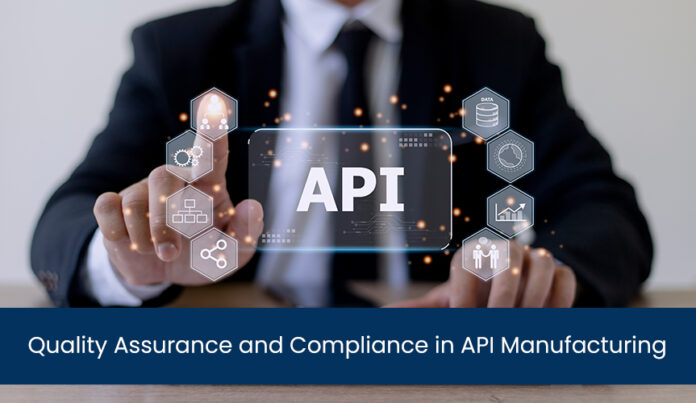Active Pharmaceutical Ingredients (APIs) are the foundational elements of any pharmaceutical product. Hence API manufacturing is essential to the pharmaceutical industry. To protect patients’ health and well-being, it is crucial to ensure the quality and compliance of APIs. This blog will address the essential steps necessary to uphold high standards as well as the necessity of quality assurance and compliance in the manufacturing of APIs.
Table of Contents
What is API?
API refers to the active pharmaceutical ingredient, which refers to the key chemical component which is solely responsible for the therapeutic effects of the pharmaceutical products. In simple terms, these APIs are the active substances that provide the intended pharmacological activity in the medication. These are quite important in order to develop and formulate various pharmaceutical products such as injections, capsules, or tablets.
Importance of Quality Assurance and Compliance in API Manufacturing:
Contract Development and Manufacturing Organisations (CDMOs) that create Active Pharmaceutical Ingredients (APIs) and other chemicals must constantly prioritise quality in all of their operations. In addition to being necessary to satisfy current Good Manufacturing Practices (cGMP) standards and legal obligations, it also distinguishes the most prosperous CDMOs.
API Manufacturing and its Role in the Pharmaceutical Sector:
The medication formulations and this API manufacturer work together to create different types of dosage, including pills, administering medication, and a number of others. When developing safe and effective medications, the reliability and calibre of the APIs are crucial.
Importance of Quality Assurance in API Manufacturing:
For an array of reasons, control of quality is crucial in the manufacturing of APIs.
Consistency and Uniformity: API Manufacturing industry standards can guarantee consistent and standardised API results through ongoing quality assurance procedures. Because of this consistency, each batch of APIs is guaranteed to possess the same characteristics, resulting in pharmaceutical products that are reliable and reproducible.
Risk Reduction: Quality control in API manufacturing assists in identifying and reducing any risks that could arise during the production of APIs, such as contamination, impurities, or quality fluctuations. By employing strong quality control procedures, manufacturers can reduce these risks while improving the safety of patients and product quality.
Regulatory Framework Governing API Manufacturing:
The manufacturing of APIs is subject to various regulatory guidelines and frameworks, including:
- Current Good Manufacturing Practices (cGMP): cGMP regulations ensure that API manufacturing processes are controlled, standardized, and consistent. These guidelines cover areas such as facility design, personnel training, documentation, equipment calibration, and validation.
- International Council for Harmonisation of the Technical Requirements for Pharmaceuticals for Human Use (ICH): ICH provides global guidelines for the quality, safety, efficacy, and pharmaceutical development of APIs. Compliance with ICH guidelines ensures international harmonization in API manufacturing practices.
Essential Quality Control Measures in API Manufacturing:
The following processes for quality assurance must be used by API manufacturers to maintain high standards:
Testing of Raw Materials: To ensure that final products meet defined quality standards, raw materials, including precursors and intermediates, are thoroughly tested and analysed.
In-Process Monitoring: During the production of APIs, it is crucial to continuously monitor the key process parameters. At different stages of the production process, this entails routine sampling and analysis in order to make sure the process is under control and fulfils the intended quality demands.
Process Validation: Process Validation is an essential quality control measure that confirms and records the effectiveness, consistency, and reproducibility of the manufacturing process.
Testing of the finished Product: After the manufacturing procedure is complete, completed APIs go through extensive testing to make sure they meet quality standards and requirements. Testing must be done for stability, contaminants, potency, and purity.
Environmental Monitoring: For the synthesis of APIs, a regulated and hygienic manufacturing environment is essential. For the purpose of to measure the levels of microbiological and particle pollution, monitoring the environment entails routine sampling and testing of the manufacturing plant. In addition to ensuring the APIs’ integrity and quality, it aids in the prevention of contamination.
Record-keeping and documentation: Proper documentation is essential to the production of APIs. It involves recording every step of the manufacturing process, including the specifications of the raw materials, the machinery used, the process parameters, the testing processes, and the outcomes.
Importance of Documentation and Traceability in API Manufacturing:
For the following reasons, documentation and traceability are crucial in the production of APIs:
Quality Control and Compliance: Thorough documentation makes sure that all manufacturing processes—including details regarding the raw materials used, the equipment used, the process parameters, and the testing procedures—are accurately recorded. This documentation makes it possible to conduct quality control analyses, makes it easier to comply with legal obligations, and guarantees the consistency of product quality.
Recalls of products and investigations: A product recall or quality problem necessitates documentation and traceability, which are essential. Manufacturers can track the origin of the issue, look into the underlying reason, and take timely corrective action with the help of accurate data. By doing so, risks are reduced, patient safety is maintained, and the reputation of the pharmaceutical company is safeguarded.
Audits and Inspections: During audits and inspections by regulatory bodies, documentation is a useful tool. It shows conformity with good manufacturing practices, offers proof of conformance to regulatory requirements, and highlights the strength of the quality management system. The transparency, reliability, and trustworthiness of the API manufacturing process are increased through well-documented records.
Continuous Improvement:
Traceability and documentation let producers track and analyze trends, pinpoint areas for development, and put improvements into practice. Manufacturers can streamline procedures, boost productivity, and promote audits and inspections in API manufacturing in API manufacturing by keeping track of data and results.
Conclusion
It is impossible to exaggerate the value of documentation and traceability in producing APIs. Effective investigations and recalls are made possible by thorough documentation, which also makes it easier to control quality. It also plays a crucial part in audits and inspections, fostering manufacturing confidence. API manufacturing industry standards may promote continuous improvement, increase patient safety, uphold the highest levels of quality, and ensure compliance by maintaining precise records and traceability.


